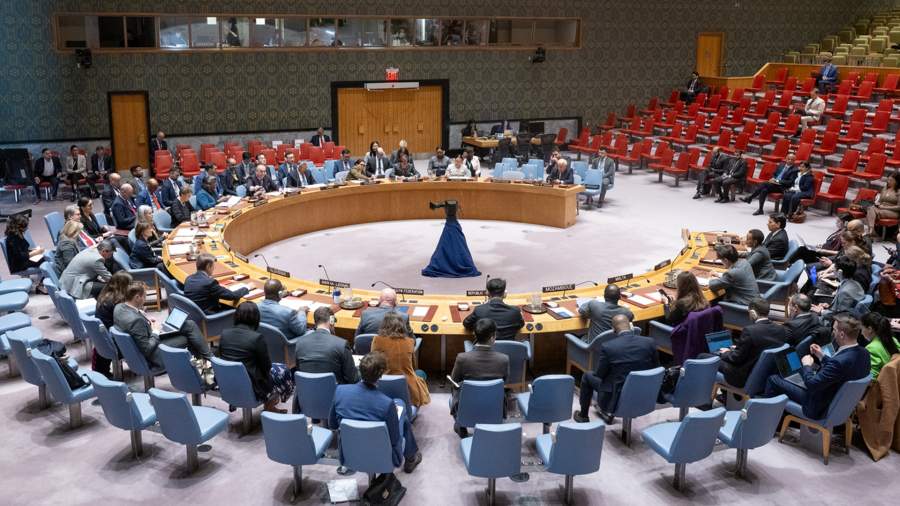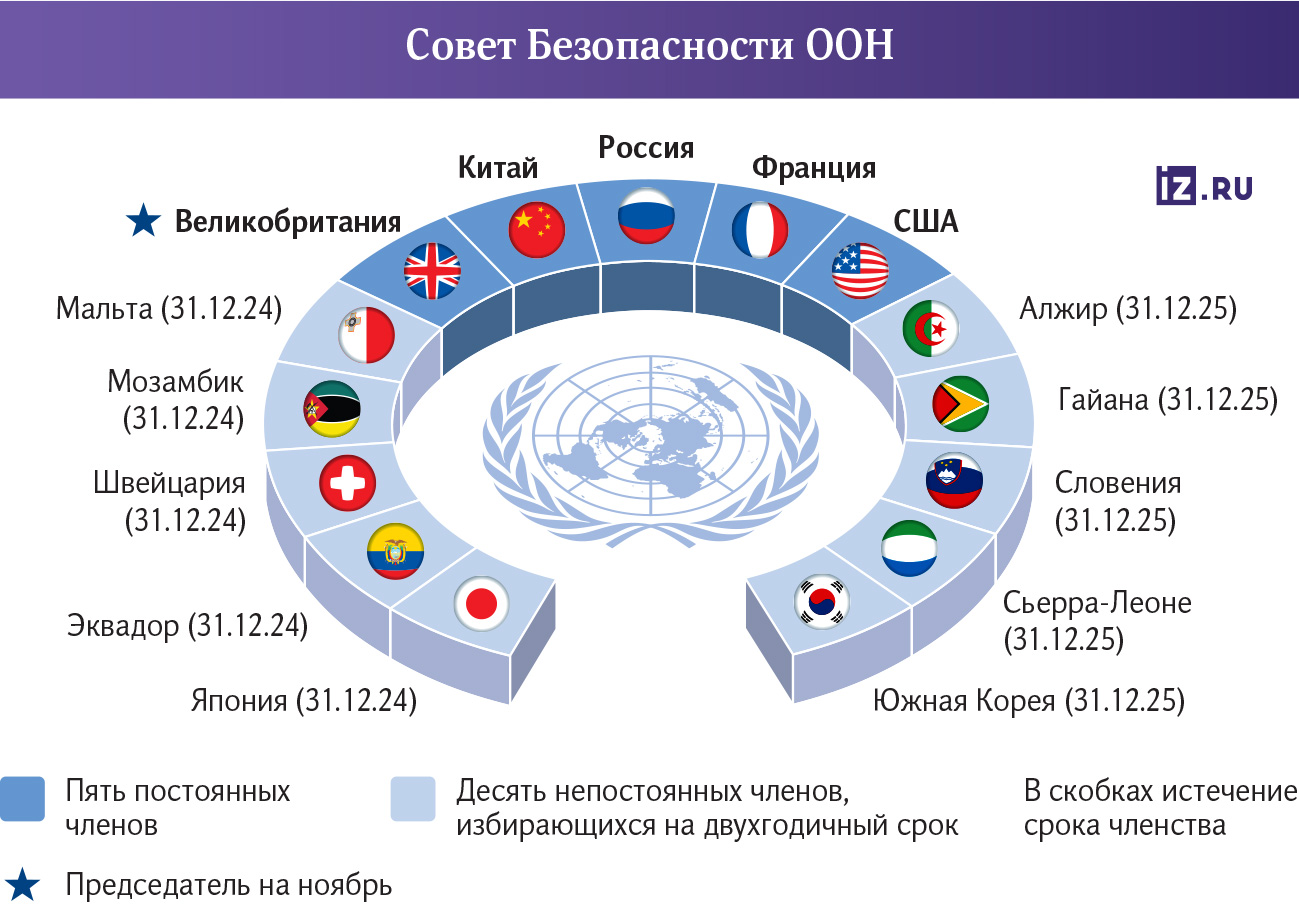Full of the powerful: the UN can't agree on reform of the Security Council

No specific candidates for seats on the renewed Security Council have been put forward yet, Russian First Deputy Permanent Representative to the UN Dmitry Polyansky told Izvestia. According to him, there are now different positions: some believe that it is enough to increase the number of non-permanent members, while others insist that the categories of permanent membership should be expanded as well. The Izvestia article tells about who could get the right of veto in the Security Council in the future and how other countries react to it.
Why reform of the UN Security Council is needed
The reform of the UN Security Council, a key body that, in fact, should play a leading role in preserving global peace, is regularly discussed. And this is due to the fact that international relations have undergone serious changes since the creation of the United Nations in 1945. The pace on the world stage is no longer set by two opposing camps, as it was in the Cold War era, or by a group of Western countries led by the United States, as it happened after the collapse of the USSR. Now there are many more centers of power on the world map that want to have a voice in the UN Security Council. Nevertheless, the world community has not yet managed to achieve any concrete results in this area.
- No concrete candidates have been put forward yet. And this is one of the problems in the reform process, because it is not clear who exactly will apply for what positions and in what category of membership," Dmitry Polyansky, Russia's First Deputy Permanent Representative to the UN, told Izvestia.
The Security Council now consists of 15 member states - five permanent and ten non-permanent - which are elected by the UN General Assembly for a two-year term. Russia, China, the United States, the United Kingdom and France have the right of veto, by which they are able to block any decision of other states. The remaining ten seats are now distributed among Algeria, Sierra Leone, Mozambique, South Korea, Japan, Guyana, Ecuador, Malta, Switzerland and Slovenia.

The question in which categories the Security Council will be enlarged has also not yet been decided. There are different positions on this issue. Some believe that it is enough to increase the number of non-permanent members - maybe give them longer terms. And others insist that the categories of permanent membership should be expanded as well, the Russian diplomat continued.
At the same time, the UN itself realizes that the moment of reform is overdue, because the only expansion of the UN Security Council took place in the 1960s, when the number of members increased from 11 to 15.
- The Security Council was formed after the Second World War. And, for example, Europe is a relatively small continent, yet six of the 15 Security Council members are now European states. Of the five permanent members of the Security Council, three belong to Europe: Russia, France and the United Kingdom," UN Secretary General António Guterres remarked in September this year.
The reform of the organization is also mentioned in the so-called Pact for the Future, which was adopted by the UN General Assembly in September. This document, which, by the way, is supposed to serve as a kind of "moral guide" for the international community, was not supported by Russia and several other countries. Moscow, in particular, criticized the absence of a provision on non-interference in the internal affairs of states. One way or another, the pact has no impact on the Security Council reform process, said Dmitry Polyansky.
- The reform process is carried out within the framework of intergovernmental negotiations," he emphasized.
The Russian Federation supports the UN reform process, but it is important to achieve changes through consensus. As Russian Foreign Minister Sergei Lavrov noted earlier, some states want to force this process and put the issue of reform to a vote of the General Assembly, where 2/3 of votes are required for approval. Beijing also opposes such a decision.
- The world is changing, and the positions of states are changing. I remember how in the Soviet period and in the early Russian period the USSR and Russia opposed the expansion of the Security Council. The question is what status the new members will have - permanent or not. When the discussions were going on, a working group was set up and met for a long time. I represented our country in this working group, there were many discussions, and at some stage representatives of what we now call the Global South, and then the Non-Aligned Movement, demanded additional seats in the Security Council, emphasizing that Britain and France are members of the same economic and military-political bloc," former UN Deputy Secretary General Sergei Ordzhonikidze told Izvestia.
Who can apply for the status of a permanent member of the UN Security Council
Russia's current position is that the UNSC should be expanded to include countries from Africa, Asia and Latin America, i.e. the states of the Global South. However, it is precisely in the choice of countries that the most serious contradictions can arise.
For example, Germany and Japan are among the states that most claim their rights to the place of permanent members. This is due to their high financial contributions to the UN budget along with the United States. But giving a place to Berlin and Tokyo at this stage will definitely not suit the Russian and Chinese sides at least because both countries are close allies of Washington, which already has a "shoulder" in the form of France and Great Britain. The Russian Federation, on the other hand, favors diversification, namely greater representation of non-Western countries.
- If we talk in terms of the economic potential of the states, Japan and Germany are, of course, the first contenders. But at the same time it coincides with the historical moral component. It was as a result of the war against the Axis countries (Germany, Japan and Italy) that the United Nations came into being. There will be a strong lobby against their candidacies," Konstantin Sukhoverkhov, RIAC program manager, explained to Izvestia.
Vladimir Putin earlier said that countries such as India, Brazil and South Africa should be included in the Security Council.
- India is seen as a country of more than one and a half billion people. Brazil claims such a position as a large state of South America and one of the advanced economies of the region, - Konstantin Sukhoverkhov specified.
It is noteworthy that Germany, Japan, India and Brazil earlier formed a "group of four", which proposed to expand the Security Council to 25 participants. The initiative implied the creation of six new permanent seats (two each for Africa and Asia, one each for Latin America and Western Europe) and four non-permanent seats (one each for Latin America, Eastern Europe, Asia and Africa).
But it must be realized that the accession of a country can provoke discontent on the part of other players. New Delhi's participation may be vetoed by Beijing due to the unresolved territorial conflict. It is not excluded that India's presence in the Security Council will be perceived negatively in Islamabad, which has previously expressed its opposition to the expansion of the UNSC by adding new permanent members. Pakistan is ready to support only the expansion of non-permanent members of the body. Argentina and Mexico (they, together with Pakistan and a number of other countries, have formed the "United for Consensus" group) also support the expansion of the UNSC with non-permanent members only. At the same time, they would probably react quite painfully to Brazil's "promotion".
However, the process is still at the discussion stage and no one is blocking the aspirations of certain countries to get a seat in the UN Security Council.
- I have not heard of any Security Council members blocking the candidacies of India and Brazil. In any case, we are still far from this stage in the process of discussing the parameters of the reform," said Dmitry Polyansky.
According to Konstantin Sukhoverkhov, Russia, China and the United States will have the final say on the expansion of the Security Council. In the current geopolitical situation it is difficult to imagine that the three will be able to find common ground on such a sensitive issue. The decision to expand the Security Council in the future may increase the representativeness of the body, but also complicate its work, especially if new countries with veto rights appear.
The enlargement could have a negative impact on the decision-making process, which is already stalled due to serious disagreements between individual countries.
Переведено сервисом «Яндекс Переводчик»

